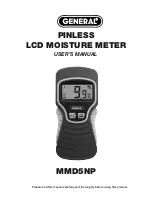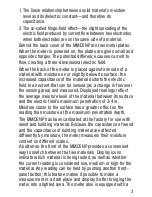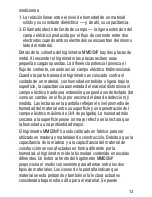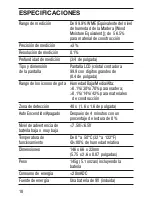
3
1. The linear relationship between a solid material’s moisture
level and its dielectric constant—and therefore its
capacitance.
2. The so-called fringe-field effect—the slight spreading of the
electric field produced by current flow between two electrodes
when both electrodes are on the same side of a material.
Behind the back cover of the MMD5NP are two metal plates.
When the meter is powered on, the plates are given small and
opposite charges. The potential difference causes current to
flow, creating a three-dimensional electric field.
When the back of the meter is placed against one side of a
material with moisture on or slightly below its surface, the
increased capacitance of the material distorts the electric
field to an extent that can be sensed (as a change in flux over
the sensing area) and measured. Displayed readings reflect
the average moisture level of the material between its surface
and the electric field’s maximum penetration of 3/4 in.
Moisture closer to the surface has a greater effect on the
reading than moisture at the maximum penetration depth.
The MMD5NP has been calibrated at the factory for use with
wood and building material. Because the capacitance of wood
and the capacitance of building material are affected
differently by moisture, the meter measures their moisture
content on different scales.
A button on the front of the MMD5NP provides a convenient
way to switch between the two materials. Display icons
indicate which material is being tested, as well as whether
the current reading is considered low, medium or high for the
material. Any reading can be held by pushing another front-
panel button; this feature makes it possible to make a
measurement in a dark place and display it after bringing the
meter into a lighted area. The meter also is equipped with a




































